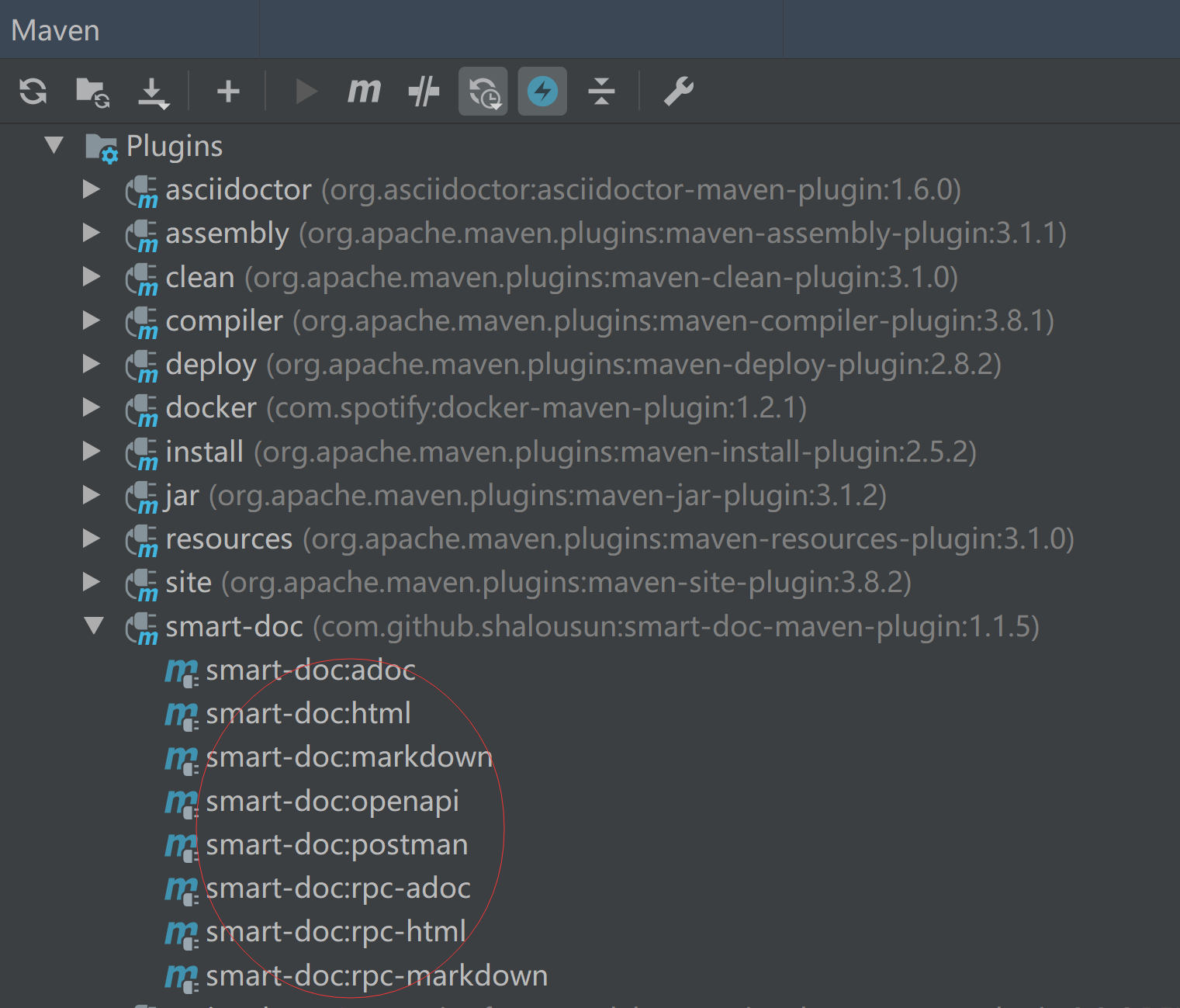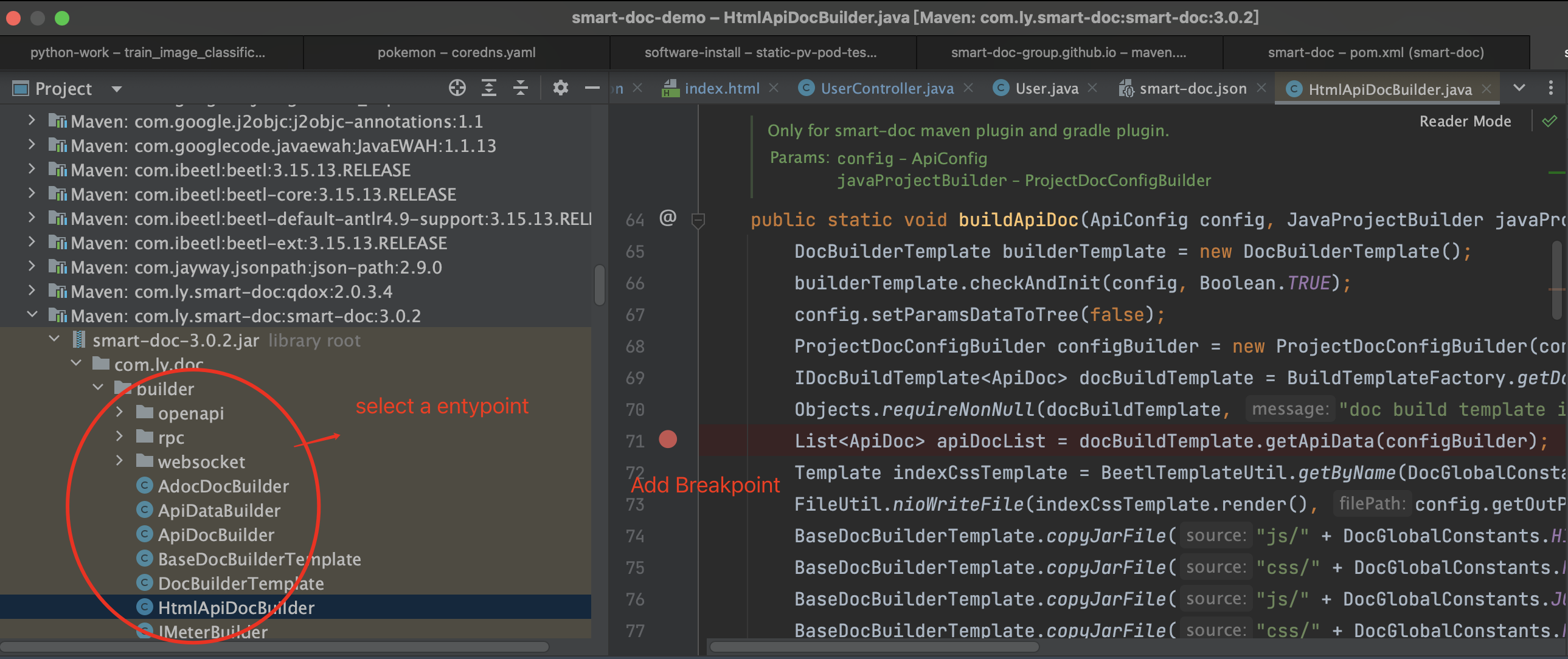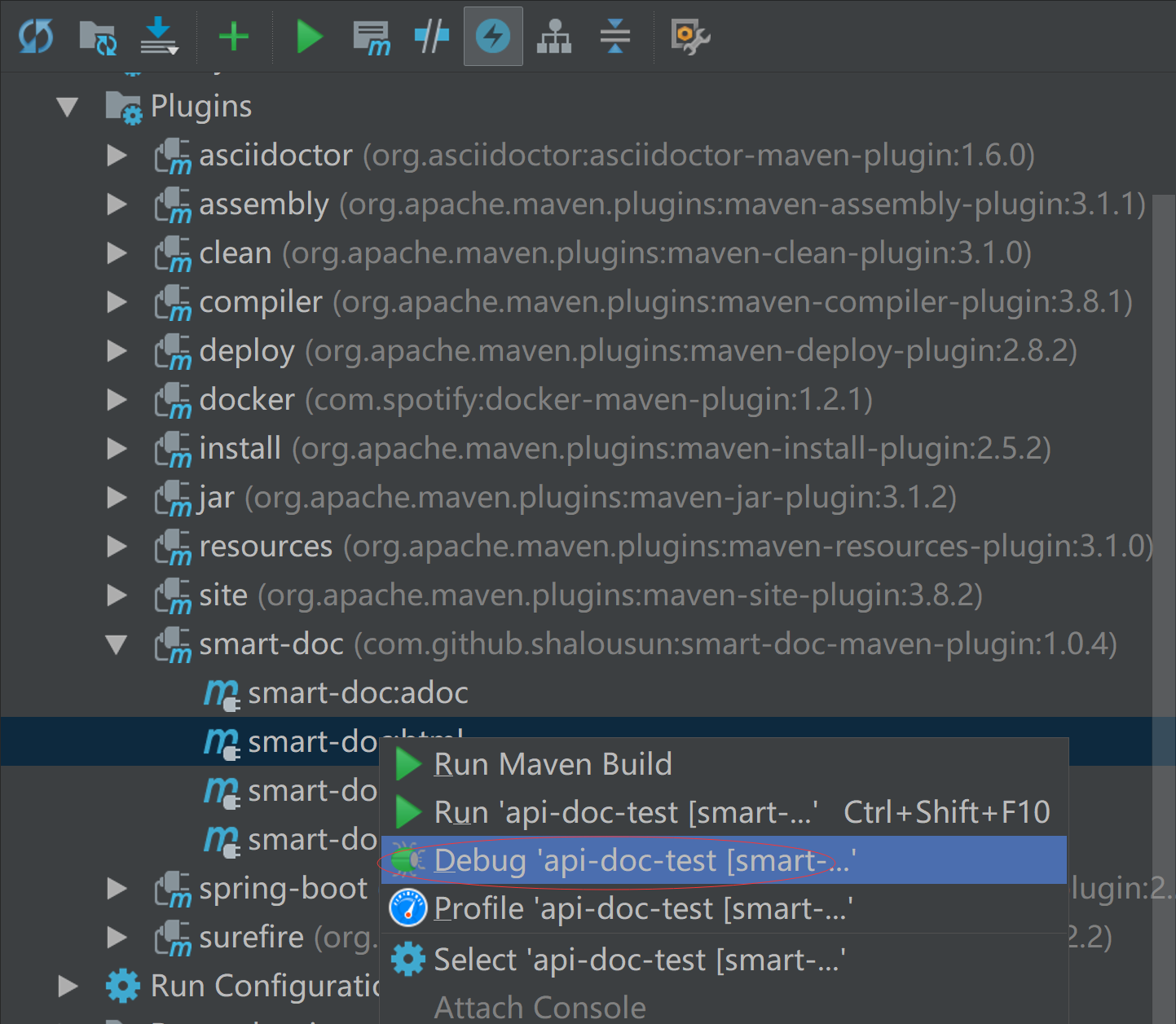Maven ^1.7.9
Starting from smart-doc 1.7.9, the Maven plug-in is officially provided, and documents can be generated directly by running the plug-in in the project.
Environmental requirements
Maven3.8+JDK1.8+
Plug-in usage scope
In versions before smart-doc-maven-plugin 1.0.2, there are various problems when using plug-ins in multi-module Maven projects.
Since the smart-doc-maven-plugin 1.0.2 plug-in, we have made a lot of efforts on the plug-in, which not only solved various problems of the plug-in in Maven multi-module, And it brings stronger source code loading capabilities to smart-doc. With the use of plug-ins, the document analysis capabilities of smart-doc are greatly enhanced.
smart-doc-maven-plugin 1.0.8 starts to support Dubbo RPC document generation.
Users using older versions of smart-doc-maven-plugin are also recommended to upgrade to the latest version immediately. It is recommended to use plug-ins when using smart-doc in the future.
After using the plug-in, there is no need to add the dependency of
smart-docin themaven dependenciesof the project, just use the plug-in directly. If you need to retain the original unit tests, you need to reference the dependency ofsmart-doc.
The usage reference is as follows:
Add plugin
<plugin>
<groupId>com.ly.smart-doc</groupId>
<artifactId>smart-doc-maven-plugin</artifactId>
<version>[latest]</version>
<configuration>
<configFile>./src/main/resources/smart-doc.json</configFile>
<projectName>${project.description}</projectName>
<includes>
<include>com.baomidou:mybatis-plus-extension</include>
<include>com.baomidou:mybatis-plus-core</include>
<include>org.springframework.data:spring-data-commons</include>
</includes>
</configuration>
<executions>
<execution>
<!--If you do not need to start smart-doc when performing compilation, comment out phase-->
<phase>compile</phase>
<goals>
<!--smart-doc provides HTML, openapi, markdown and other goals, which can be configured as needed.-->
<goal>html</goal>
</goals>
</execution>
</executions>
</plugin>configuration
configFile
Specify the configuration file used for generating documents. When using relative paths, please start with './', for example: ./src/main/resources/smart-doc.json. If you are using the plugin through the mvn command, you can also specify it in the command line by using the -DconfigFile parameter, such as:
mvn -Dfile.encoding=UTF-8 -DconfigFile="src/main/resources/smart-doc.json" smart-doc:htmlNote: In the pom.xml file, the configFile setting of the smart-doc plugin has a higher priority than the command line. If you want to specify the configFile using the command line, please remove the configFile configuration from the pom.xml.
projectName
Specify the project name. It is recommended to use dynamic parameters, such as ${project.description}.
Starting from 2.3.4, if the projectName is not set in smart-doc.json or here, the plug-in is automatically set to the projectName in the pom.
excludes & includes
excludes & includes are used to control the loading of source code.
Loading source code mechanism
smart-doc will automatically analyze the dependency tree and load all dependent source codes, but this will cause two problems:
- Loading unnecessary source code affects document construction efficiency
- When some unnecessary dependencies cannot be loaded, an error will be reported (smart-doc defaults to all dependencies being required)
Depend on matching rules
- Match a single dependency:
groupId:artifactId - Regular matching of multiple dependencies:
groupId:.*
includes
Use includes to load dependencies on demand and reduce unnecessary dependency resolution.
Note: If includes are configured, the plugin will only load dependencies specified in includes. The loading is no longer based on the dependency resolution specified in the pom.
Usually the only dependencies we need are a few common third-party libraries, the company's internal second-party libraries, and other modules in the project.
<includes>
<include>com.baomidou:mybatis-plus-extension</include>
<include>com.baomidou:mybatis-plus-core</include>
<include>org.springframework.data:spring-data-commons</include>
</includes><includes>
<!--Load all dependencies with groupId com.xxx-->
<include>com.xxx:.*</include>
</includes>excludes
When running the plug-in, if some Class cannot be loaded, exclude the dependencies of the Class.
<exclude>
<!--Exclude mongodb dependency-->
<exclude>org.springframework.boot:spring-boot-mongodb</exclude>
</exclude>excludes & includes best practices
To use include, load the required source code. If you don’t need other dependencies, you can write the project’s own
groupId:artifactIdAfter encountering an error, use
excludestoexcludethe dependencies of the error.
Add configuration for smart-doc generated documentation
Add and create a smart-doc.json configuration file in the project. The plug-in reads this configuration to generate the project documentation. This configuration content is actually the result of converting ApiConfig written by unit test into json, so for the description of configuration items, you can refer to the configuration of the original unit test.
Minimum Hive:
{
"outPath": "D://md2" //Specify the output path of the document
}For detailed configuration, please refer to the specific documentation (Customization | Configuration items)
In the above json configuration example, only "outPath" is required. Other configurations can be configured according to the needs of your own project.
Note: For old users, you can convert ApiConfig into json configuration through Fastjson or Gson library.
Run the plug-in to generate documentation
5.1 Using maven command line
mvn -Dfile.encoding=UTF-8 smart-doc:html
// Generate document output to Markdown
mvn -Dfile.encoding=UTF-8 smart-doc:markdown
// Generate document output to Adoc
mvn -Dfile.encoding=UTF-8 smart-doc:adoc
// Generate Postman.
mvn -Dfile.encoding=UTF-8 smart-doc:postman
// build Open Api 3.0+,Since smart-doc-maven-plugin 1.1.5
mvn -Dfile.encoding=UTF-8 smart-doc:openapi
// Generate document and push to torna
mvn -Dfile.encoding=UTF-8 smart-doc:torna-rest
// Generate document output to Word.
mvn -Dfile.encoding=UTF-8 smart-doc:word
// Generate Jmeter performance pressure test scripts.
mvn -Dfile.encoding=UTF-8 smart-doc:
// Apache Dubbo RPC
// Generate html
mvn -Dfile.encoding=UTF-8 smart-doc:rpc-html
// Generate markdown
mvn -Dfile.encoding=UTF-8 smart-doc:rpc-markdown
// Generate adoc
mvn -Dfile.encoding=UTF-8 smart-doc:rpc-adoc
mvn -Dfile.encoding=UTF-8 smart-doc:torna-rpc
// Generate documentation for some interface classes and static utility classes marked with `@javadoc`. Supported from version 3.0.5
// Generate html
mvn -Dfile.encoding=UTF-8 smart-doc:javadoc-html
// Generate markdown
mvn -Dfile.encoding=UTF-8 smart-doc:javadoc-markdown
// Generate adoc
mvn -Dfile.encoding=UTF-8 smart-doc:javadoc-adocIf you want to view the debug log when building using the mvn command, the debug log can also help you analyze the source code loading status of the smart-doc-maven plug-in, you can add a -X parameter. For example:
mvn -X -Dfile.encoding=UTF-8 smart-doc:htmlNote: Especially under the window system, if you actually use the mvn command line to perform document generation, garbled characters may appear, so you need to specify -Dfile.encoding=UTF-8 during execution.
View the encoding of maven
# mvn -version
Apache Maven 3.3.3 (7994120775791599e205a5524ec3e0dfe41d4a06; 2015-04-22T19:57:37+08:00)
Maven home: D:\ProgramFiles\maven\bin\..
Java version: 1.8.0_191, vendor: Oracle Corporation
Java home: D:\ProgramFiles\Java\jdk1.8.0_191\jre
Default locale: zh_CN, platform encoding: GBK
OS name: "windows 10", version: "10.0", arch: "amd64", family: "dos"5.2 Generate documentation in IDEA

Plug-in source code
Plug-in debugging
Some errors may occur when using the smart-doc-maven-plugin plug-in to build and generate API documentation. If some complex problems arise, just put the error message roughly in the mention of issue, Officials cannot solve the problem based on these simple error messages, because we cannot simulate the user's usage environment and the code written. Therefore, we hope that users who use smart-doc-maven-plugin can use debug to obtain more detailed information when reporting errors. Adding a detailed problem description when raising an issue will also help us correct the problem more quickly. The following will introduce how to debug the smart-doc-maven-plugin plug-in.
Add smart-doc dependency
Because smart-doc-maven-plugin ultimately uses smart-doc to complete the source code analysis and document generation of the project, Usually the actual debugged code is smart-doc. But this process is mainly checked through smart-doc-maven-plugin.
<dependency>
<groupId>com.ly.smart-doc</groupId>
<artifactId>smart-doc</artifactId>
<version>[latest]</version>
<scope>test</scope>
</dependency>Note: It is best to use the same version of smart-doc as the version of smart-doc that the plug-in depends on.
Add breakpoint
Add breakpoints as shown in the figure 
Run the build target in Debug mode
It is very simple for the maven plug-in to run debug in idea. The operation is as shown below.  This way you can go directly to the breakpoint.
This way you can go directly to the breakpoint.
Tips: The above is the source code of smart-doc that is used as an entrance to debug through the plug-in. If you want to debug the source code execution process of the plug-in itself, add the plug-in dependencies to the project dependencies, as follows:
<dependency>
<groupId>com.ly.smart-doc</groupId>
<artifactId>smart-doc-maven-plugin</artifactId>
<version>[Latest version of maven warehouse]</version>
</dependency>then pass above Similar steps to debug the source code of smart-doc-maven-plugin